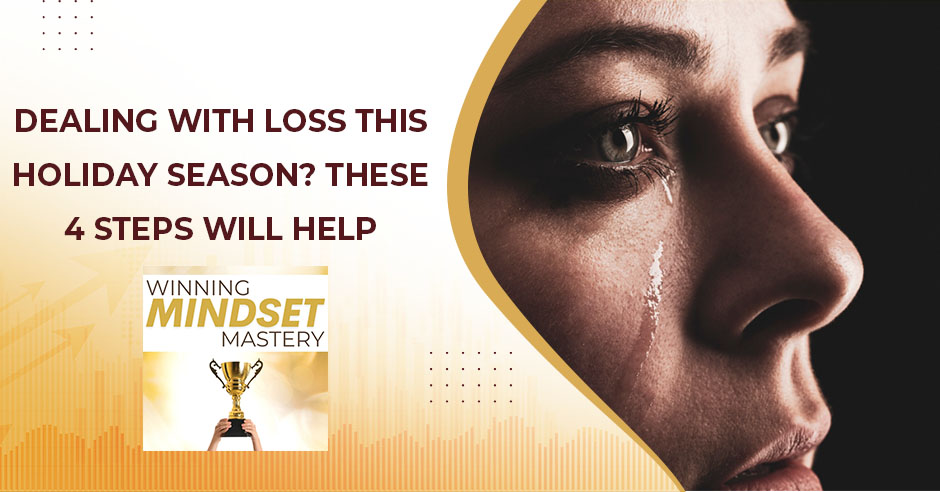
The holiday season is traditionally a time to gather with the most cherished individuals in your life. However, for those in the midst of the grieving process following the loss of a loved one, the prospect of celebrating or enjoying a well-deserved break may seem daunting. In light of this, April Shprintz provides four strategies for coping with grief during the holiday season. Her guidance offers a valuable opportunity to navigate the challenging emotions and memories associated with loss more effectively.
—
Listen to the podcast here
Dealing With Loss This Holiday Season? These 4 Steps Will Help
I am glad you’re here. We are right in the middle of the holiday season. One of the things that a lot of people struggle with during the holiday season is grief and the way that it impacts them. Also, they want to go and do all the things in the holiday season but also feel held back by their grief or don’t know how to deal with it, especially if this is the first series of events after you’ve lost someone.
I had someone ask me if I had any thoughts for people who are going through grief and how mindset might help with that. This is a great question because grief is something that we are all impacted by in some way, shape, or form at some time in our lives. If there’s any way that I can make that easier for folks, I absolutely want to do it. I’ll tell you my top four things on how I deal with grieving the loss of a person or even if you’re grieving the loss of a relationship or a job because grief can take many different forms.
It’s different for each and every one of us. Something that knocks one person down may feel or look like it’s not impacting another person because we all feel things differently, but that one common denominator is that we all do need to feel our feelings when it comes to grief. Candidly, if you do things to distract yourself and you do things to make yourself busy, don’t deal with it. Go and find other ways to distract yourself.

Holiday Season: Grief can take many different forms. But its one common denominator is the need to feel our feelings.
You’re going to run into that grief again and again because you won’t process it and go through it. The first thing is to feel those feelings. What I’ll tell you is having both gone through when I didn’t want to feel grief at all and all I tried to do was distract myself. When I just embraced those feelings when I was overcome with them because grief tends to come in waves for most people, it was much easier to get through. It wasn’t as painful to experience as the fear of it was and it also was much shorter.
Now, it’s not necessarily the entire grieving time but those times of intense pain are shorter and easier if you just roll with them. It’s almost like if you think about if you’ve ever been in the ocean and you try and stand still and fight against a wave or if you move your body with it as it breaks up against you. Grief is very similar.
The grieving process can be shorter and easier if you just roll with them. Share on XThe second thing is to let yourself be sad and that sounds so weird because most people feel like, “I can’t even prevent myself from being sad.” However, in a lot of ways, we decide with some arbitrary time or amount of grieving that this is when we shouldn’t be sad anymore. We try to not be sad for other people because we don’t want to bring them down. I encourage you to let yourself go through whatever it is that you need to go through, whenever it is that you need to go through it.
If that means that you’ve got a step away from a holiday gathering because as wonderful of a time as you’ve seen people, it made you think of someone who isn’t there, then you do that. If that means that you have to skip out on things that you would normally do so you can take care of and nurture yourself, do that. There is nothing more important than you and taking care of yourself in the best way because that’s how you’ll be able to show up for other people in the long term.
You may say, “That sounds great, April but I have this and I have that.” A lot of times, those are self-imposed beliefs and people will run you slack or help you because maybe you need to fulfill something for your kids or your family so that you can take that time to be sad and move through whatever it is that you’re trying to move through.

Holiday Season: Not speeding through grief and having it be more genuine will help you both in the remembrance and in your ease of processing what’s happened.
The third part is to focus on what you’re grateful for. What I think is important here is to notice that first I said to feel your feelings and then I said let yourself be sad. Let yourself surf the couch for a week, a month, or whatever it takes for you to get through those feelings before you try and focus on the gratitude part. I don’t want you to push yourself through those other two things too quickly because being able to focus on what you’re grateful for is a different place in the grieving process.
I don’t want you to think that because we’re trying to have the mindset that empowers us to get through what happened it means that you can’t take the time to feel it and you need to put a happy face on all of it because you don’t. When you get to the place where it feels natural, that’s where the memories come in. That’s where you talk about the gratitude for the time that you got to spend with that individual and the things that you learned and loved. Not speeding through it and having it be more genuine will help you both in the remembrance and in your ease of processing what’s happened.

Holiday Season: Don’t be afraid to reach out to the people who care about you. They want to be there for you.
My last tip is about getting back to being you and that point where you’ve gone through the process enough that you know you want to be yourself, but you almost feel like a deflated balloon. You can’t get there. You don’t have the energy. You don’t have the motivation, the desire, and those sorts of things. This happens to me in the grieving process. I’ll go from being sad to like there’s just nothing. I have no energy.
As someone super driven and loves to do and accomplish things, it can be just as concerning for me as the sadness is because I can’t get back to being myself. Without a doubt, the one thing that always gets me back on track is to take the focus at that point off of myself because of nurtured myself. I’ve gone through the things that I need to go through to put that focus on other people.
How can I help someone? How can I do something that makes someone else’s life easier? How can I be of assistance? It does a few things. Number one, it gives you some momentum and gets you out of the house, or maybe it gets you on the phone with someone or on Zoom. However, it also puts you in a different headspace because instead of in that headspace of sadness and what you’re feeling, you’re in the headspace of helping someone else and empowering someone else. It can be something that generates great momentum and lifts your spirits and you feel better.
Lastly, you have that lasting feeling of knowing that you have been able to connect with someone, make their life better, and help them feel better. I hope this is helpful to you, especially if this is your first season of dealing with the loss or even if it’s your second or third and maybe you didn’t deal with it like you wanted to the first time. I want you to know that grief is not linear and any and all of these things can be helpful to you wherever you are in your process.
Don’t be afraid to use them. Don’t be afraid to reach out to the people who care about you. They want to be there for you. Don’t be afraid to reach out to me. If you don’t have anyone else to reach out to, hit me up on my website or email me at April@DrivenOutcomes.com. I want to be there to help. Here’s to your success.





